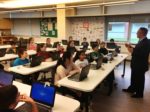What do you think happens when classrooms are equipped with high-end technologies, such as interactive whiteboards and laptop computers, and teachers are encouraged to use high-quality free content featuring popular characters like Curious George and Sid the Science Kid?
Not surprisingly, kids learn math and teachers grow more confident teaching math.
This is according to findings from the Prekindergarten Transmedia Mathematics Study, released last week by the Fred Rogers Center, Education Development Center and SRI International. Specifically, the study revealed that preschool teachers who enacted the PBS KIDS Transmedia Math Supplement reported significant changes in their confidence and comfort level with early mathematics concepts and teaching with technology. The goals was to understand math learning and teaching in real classrooms—92 of them in New York City and the San Francisco Bay Area.
So, while all these fun, education apps are great, choosing the appropriate ones and having educational expertise to back it up makes a big difference.
“A sharp, cohesive curricular focus adds potency to a common approach to technology integration, which tends toward the general and aspirational and often leaves teachers to select resources piecemeal and on their own,” a blogger for the Fred Rogers Center wrote.
Melissa King, K12’s director of early learning and product advancement, agrees. Developers at K12 kept this in mind while working on the recently released EmbarK12 Comprehensive program for preschoolers.
“One of the pitfalls, for example, of having so many apps available and the purchase of tablets en masse in many districts is the lack of a coherent strategy for implementing quality content with digital offerings,” King says. “Unfortunately, an ad hoc approach that basically says, ‘choose an app’ and have fun may not lead to optimal learning experiences with technology.”
Conversely, when teachers are prepared with the content knowledge and the pedagogical expertise needed to mediate children’s learning with technology, children may make best use of learning opportunities available through engagement with digital media. The study supports the promise of well-balanced digital content when combined with knowledgeable teacher guidance. In fact, these new tools may contribute to young children’s mathematics skills and conceptual understanding.


























































